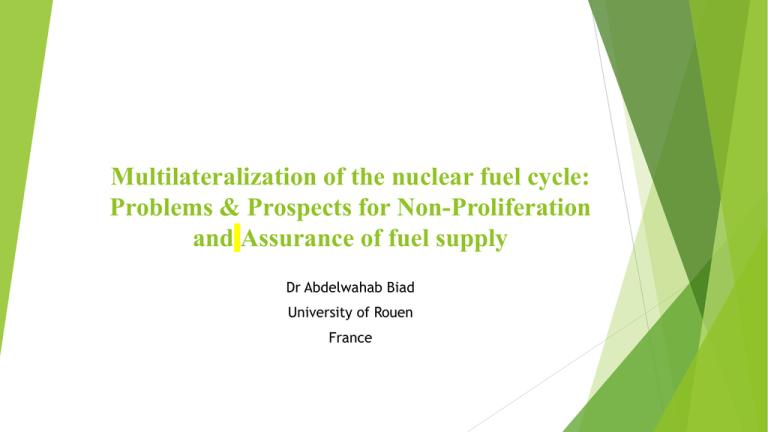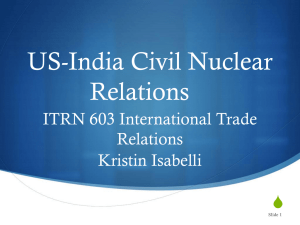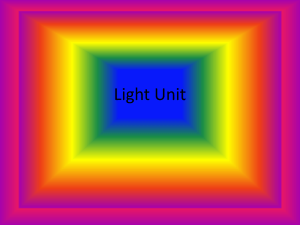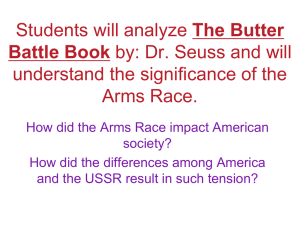Multilateralization of the nuclear fuel cycle: Problems & Prospects for
advertisement

Multilateralization of the nuclear fuel cycle: Problems & Prospects for Non-Proliferation and Assurance of fuel supply Dr Abdelwahab Biad University of Rouen France Multilateralization of the nuclear fuel cycle : Problems & Prospects for Non-Proliferation and Assurance of fuel supply Main challenges: -> Problem of the inherent dual use of nuclear energy. -> Prevention of proliferation of nuclear weapons -> Issue of access to enrichment and reprocessing -> Needs for assurance of fuel supply -> Managment of trade of nuclear fuel and services -> Issue of state sovereignty on nuclear fuel cycle -> Verification & control mechanisms Multilateralization of the nuclear fuel cycle : Problems & Prospects for Non-Proliferation and Assurance of fuel supply MNFC would lead to at least two desirable consequences: 1. A contribution to enhanced supply assurance, which would increase the stability and confidence of States deciding to engage in the peaceful use of nuclear energy. 2. Positive non-proliferation and confidence-building effects with regard to important parts of the nuclear fuel cycle. History of MNFC (1) 1946-1950: Baruch Plan & Acheson-Lilienthal Report 1953: Atom for Peace 1957: IAEA 1957: EURATOM History(2) 1975-1977 : IAEA Study on Regional Centres for nuclear fuel cycle. 1978-1982 : IAEA Expert Group on International Plutonium Storage. 1980-1987 : IAEA Committee on Assurances of Supply (CAS). 2005: IAEA Expert Group Study on Multilateral Approaches to the Nuclear Fuel Cycle. MNFC 3 options Assurance of fuel supply. National enrichment plans to be converted to multinational plan. Global & multinational enrichment facilities. Assurance of fuel supply (1): supplier guarantees World Nuclear Association proposal for ensuring security of supply— collective guarantees of supply of uranium enrichment services provided by nuclear industry and supported by governments and the IAEA. Six-country concept—assurances of supply of uranium enrichment services provided by supplier states and supported by the IAEA. Japanese standby arrangements proposal—assurances of supply of all front-end fuel-cycle services. UK nuclear fuel assurance proposal—assurances of supply of uranium enrichment services provided by supplier governments through guaranteed export licenses. Assurance of fuel supply (2): LEU banks US LEU reserve—a nationally controlled reserve of LEU as a backup to an international assurance supply mechanism. Russian guaranteed LEU reserve—an IAEA-safeguarded and controlled reserve of 120t of LEU in Angarsk provided and maintained by the Russian Federation. IAEA LEU bank—an LEU reserve owned and managed by the IAEA. Multilateral uranium enrichment facility proposals International Uranium Enrichment Centre—a multinational uranium enrichment centre in Russia under IAEA safeguards with no access to enrichment technology by stakeholders. Multilateral enrichment sanctuary project (Germany)—an IAEA-controlled international uranium enrichment plant in an extraterritorial area with no access to technology by stakeholders. Gulf Cooperation Council multinational nuclear consortium— an international uranium enrichment consortium for the Middle East that could be based in a neutral country outside the region with no access to enrichment technology by stakeholders. Global multilateral infrastructure proposals Russian Global Nuclear Power Infrastructure—a system of international centres providing fuel-cycle services on a non-discriminatory basis and under IAEA control. US Global Nuclear Energy Partnership—the full spectrum of front-end and back-end services provided by a limited number of supplier states using new proliferationresistant technologies. Austrian proposal on multilateralization of the nuclear fuel cycle—a multilateral framework of supervision of all stages of the nuclear fuel cycle. Progress in practical implementation Today we see greater progress in the direction of the practical implementation of multilateral fuel-cycle arrangements than during the 1970s and 1980s. Four proposals for multilateral approaches to the nuclear fuel cycle are in various stages of implementation: 1-> the Russian International Uranium Enrichment Center (IUEC). 2-> the Russian guaranteed low-enriched uranium (LEU) reserve. 3-> the IAEA LEU bank. 4-> the United Kingdom’s nuclear fuel assurance proposal. Achievements (1) The International Uranium Enrichment Center The IUEC was established in 2007 in Angarsk (Irkoutsk Siberia). Three states—Russia, Kazakhstan and Ukraine—are IUEC stockholders. Four proposals for multilateral approaches to the nuclear fuel cycle are in various stages of implementation. The IUEC provides its partners with guaranteed access to enriched uranium product or a share in profits. Achievements (2) The Russian guaranteed LEU reserve IAEA Board of Governors adopted resolution GOV/2009/81 of 27 November 2009, authorizing the Russian Federation to establish a guaranteed LEU reserve. The world’s first multilateral reserve of LEU inaugurated on 17 December 2010. LEU reserve for supply to state members of the IAEA experiencing a disruption in supply of LEU for nuclear power plants not related to technical or commercial considerations. 120 tons of LEU. Under IAEA supervision. Achievements (3) IAEA LEU bank IAEA Board of Governors adopted resolution GOV/2010/70 of 3 December 2010, approving the creation of an IAEA LEU bank. Achievements (4) The United Kingdom’s nuclear fuel assurance proposal The UK’s nuclear fuel assurance proposal is designed to enhance confidence in commercial fuel supplies. The proposal envisions agreements between a supplier state and a non-supplier state, that commercial LEU supply contracts will not be disrupted for any non-commercial reason other than those directly related to nuclear non-proliferation concerns. The process would be overseen by the IAEA. On 10 March 2011 the IAEA Board of Governors voted in favor of the proposal. Prospects Despite few successes, the future of multilateralization of the nuclear fuel cycle is unclear. The idea of multilateralization of the nuclear fuel cycle has received support from many governments, particularly of supplier states, but not all of them. However, the policies of leading supplier states towards MNFC are uncoordinated and subject to change. At this point, a coordinated strategy for multilateralization does not exist. Problems No technology holder has expressed any inclination to seriously discuss the conversion of their national fuel-cycle facilities into multilateral operations - such conversion have never been seriously discussed at the national or international level. Opponents of conversion of national fuel-cycle facilities argue that this would involve too many complex political, legal and financial issues. Nuclear suppliers should understand that existing nationally controlled enrichment and reprocessing facilities do create a discrimination problem. Their existence makes it more difficult to convince other states not to pursue nationally controlled facilities of their own. Lack of confidence among some non-nuclear states (fear of “nuclear cartel”) Questions How can “equality” and “non discrimination” be achieved in MNFC? Can MNFC efficiently contribute to solutions of nuclear non-proliferation challenges? Would MNFC be better pursued at regional level ? Can the MNFC contribute to the revival of the nuclear trade? Is MNFC an incentive for states to give up their inalienable right to develop national enrichment and reprocessing capabilities? Obstacles The tension between supplier and non-supplier states on the issue of multilateral approaches. Commercial competition among nuclear industry companies. Gap in development and expertise on the use of nuclear energy. Risk of Proliferation and regional conflicts in Middle East and North East Asia. The public fears about nuclear energy following the nuclear incident at the Fukushima Daiichi power plant (March 2011) where many safety measures failed. The nuclear incident make Japan & Germany abandoned plans to expand nuclear power Unresolved challenges in the long-term management of nuclear waste. Challenges that the international community faces To find a way to manage the global nuclear fuel cycle in order to reduce proliferation risks to acceptable levels. To provide all states with non-discriminatory access to peaceful applications of nuclear technology. To build a broad coalition of states - both supplier and non-supplier - supporting a politically and economically attractive strategy towards multilateralization of the nuclear fuel cycle. To ensure a reliable supply of electricity and to reduce threats to energy security. To remove certain roadblocks to nuclear disarmament.



![The Politics of Protest [week 3]](http://s2.studylib.net/store/data/005229111_1-9491ac8e8d24cc184a2c9020ba192c97-300x300.png)


